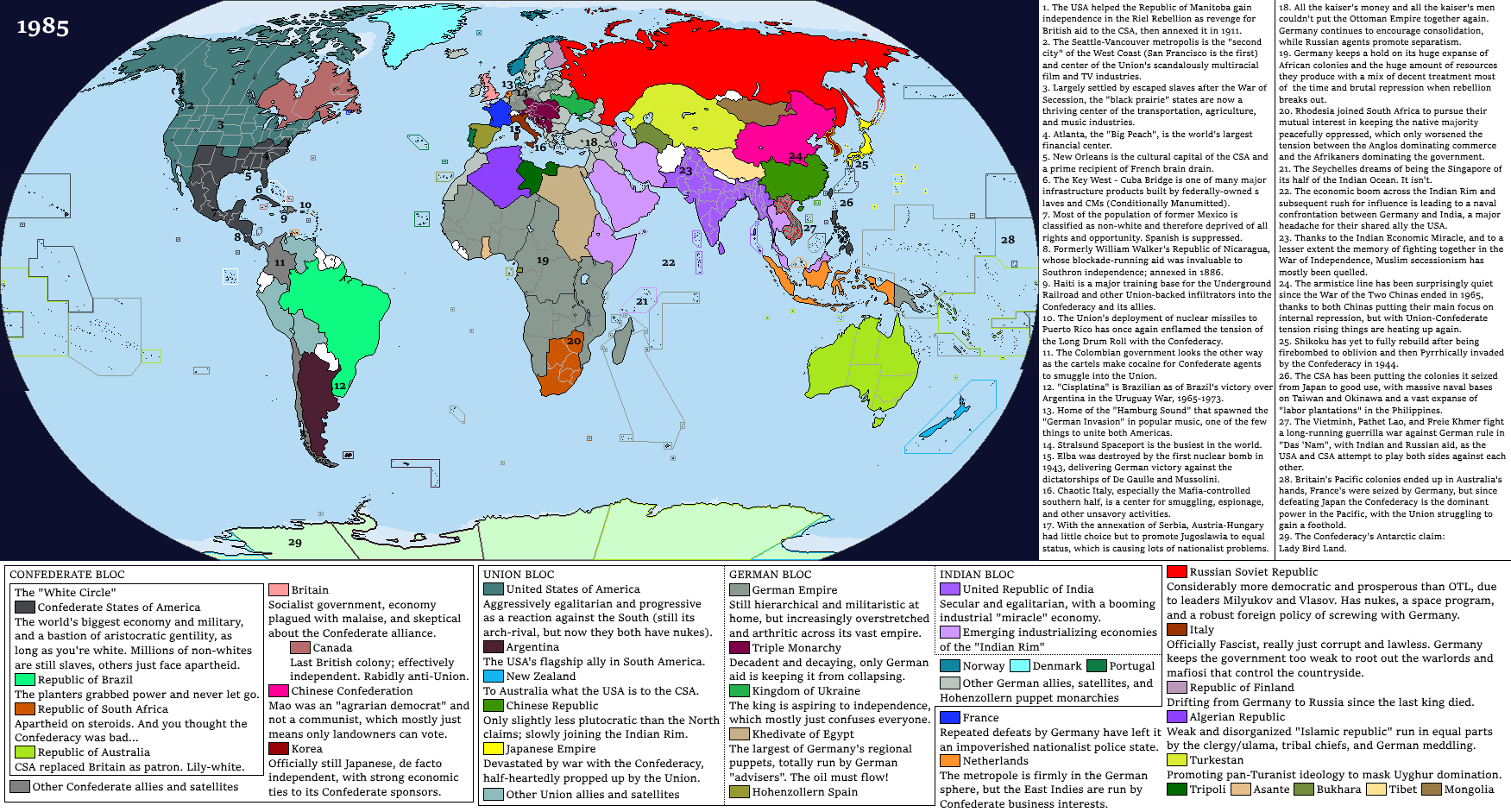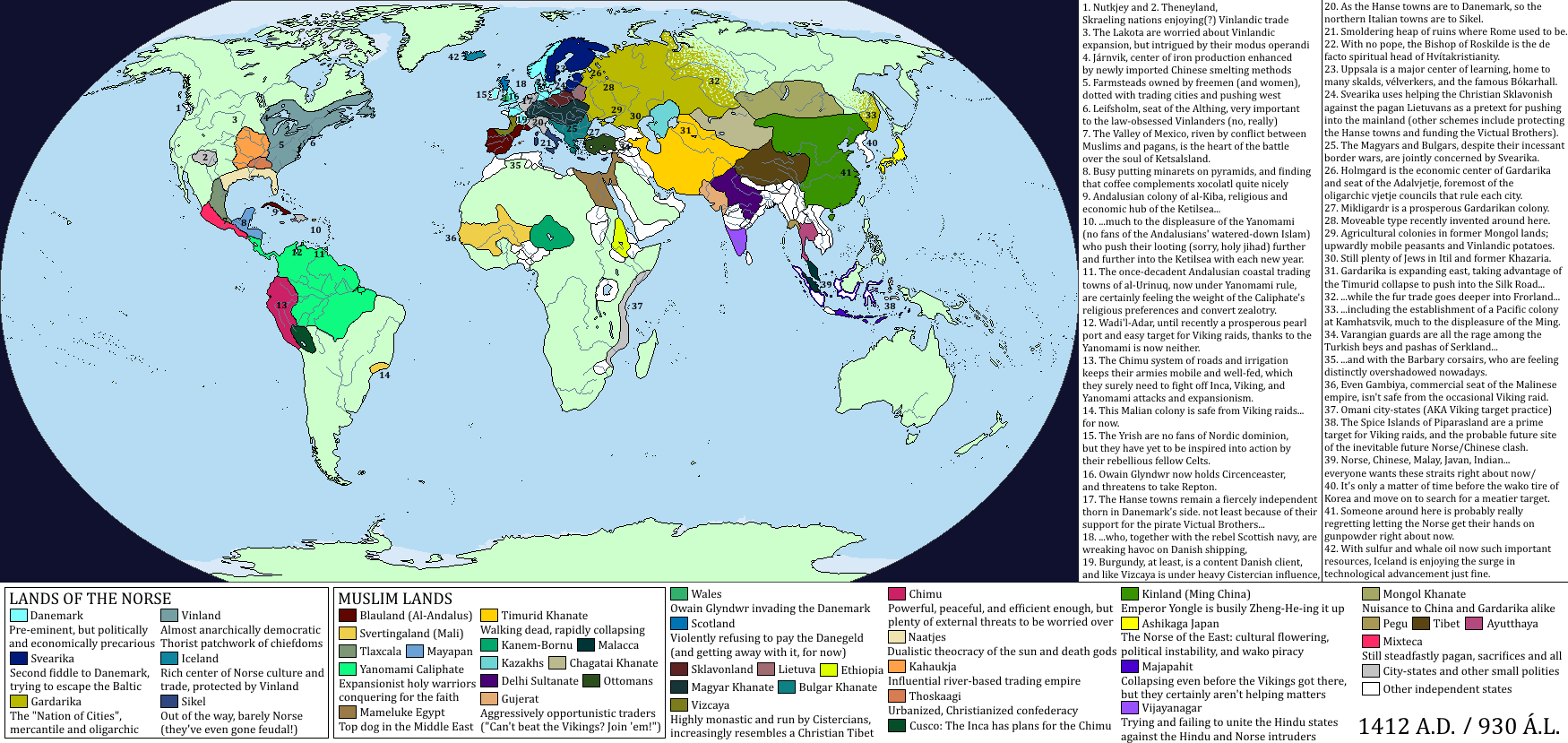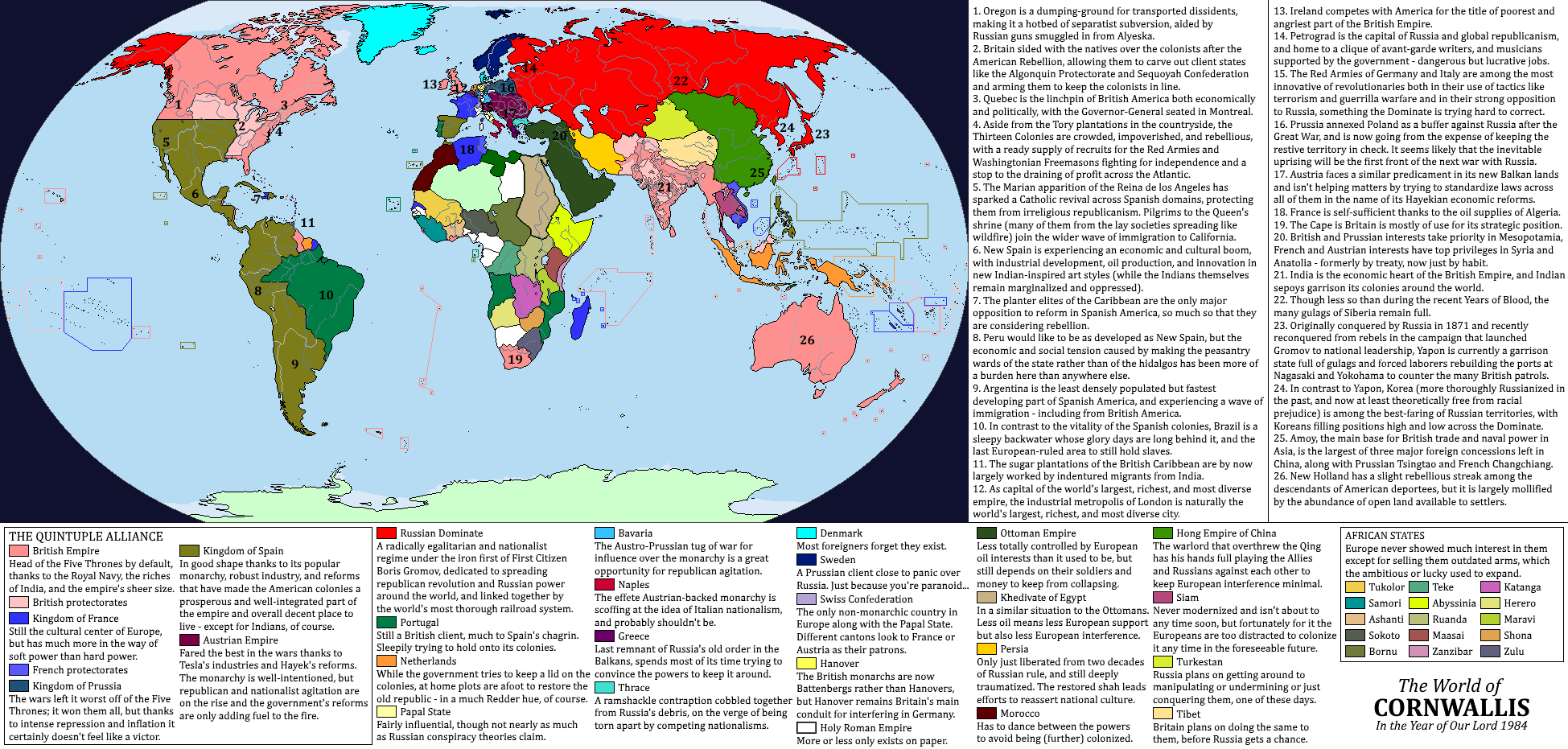If you don't mind, I thought I'd contribute:
The world of GURPS Alternate Earths 2 Aeolus, some 40 odd years on...
This is a world where William of Orange failed to make it to Britain in 1688, and James II ultimately succeeded (with some French subsidies) in overcoming Parliament. With Britain in the French court, the Bourbon's ambitions were realized, including even the dreamed of Spanish-French union, creating a Catholic superpower dominating Europe. Catholicism revives in Britain, and a series of hardline Protestant revolts brings a cycle of repression and hardening attitudes that leads to a large-scale immigration to the American colonies, where apocalyptic Protestantism leads a fervent new religious revival, in the end leading to a break from "Papist" Britain.
Of course, all things come to an end, and a 19th century Spanish rebellion plus an Austrian-Russian-pissed off minor German state alliance put an end to la glorie, to a considerable extent. The French and Spanish American colonies eventually departed as well. The Habsburgs had their own day in the sun, and even get a family member on the throne of Russia (the War of the Russian Succession ends up with the Romanov candidate in American exile), only in turn to fall to republican revolution: a unified multinational state rather than a bunch of wee republics results thanks to the brutal efforts of the Russian Habsburg Czar to crush the rebels regardless of ethnicity and reinstall his relative.
A second war would be needed to confirm the continued survival of the Republican Alliance, later the Federated Republics, with Habsburg Russia coming back for a second round and the French monarchy joining in, the Bourbons having come to the conclusion, with the rise of their own Republicans, that the Republics represented an existential threat to all that was good and French and Bourbon. This round ended with the collapse of both enemy powers in rebellion...
Today, the Federated Republics are the world's greatest industrial and scientific power, and with it's allies dominates Europe and what we would call Latin America, while the remaining absolute or at least authoritarian monarchies are on the defensive, but things are far from entirely rosy. The Republics face internal ethnic issues (the Magyars are being bitchy, the Belorussians want their own state, and everyone thinks the Germans are too powerful - fortunately the Germans can rarely agree on anything for more than five minutes straight, so the "unify all Germans in one mega-state" idea remains theoretical). There are ongoing efforts to create a pan-FR nationalism based, like US nationalism, on common principles, the historical struggles, democratic ideals, etc., which the more idealistic hope can be extended one day to the rest of Europe. The main Lingua Franca (heh) is German supplemented by French (still the second language of most educated people), and boy there have been a lot of proposed "neutral languages", from Latin to three or four version of *Esperanto. Multilingualism remains much more the norm than, say, the US OTL, and anyone who doesn't have at least two languages under their belt is considered a bit of a simpleton or assumed to have just fallen off the turnip truck.
The Federated Republics don't get along too well with their supposed French allies, who may be grateful on some level for the war bringing democracy, but can't help remembering that this happened due to the FR kicking their teeth in. They don't get along at all with the Russians, whose Republic is dominated by nationalist parties that want their Lost Lands back and who despise the Federated Republics secular, multi-cultural approach. Their Latin American allies, meanwhile, are a variegated if generally shaky bunch, aside from L'Argentine.
They also don't really get along with the American Commonwealth, which although it has democratized a bit (the office of Lord Protector lost quite a bit of its power to the Council of Judges, the Parliament-equivalent, after some truly spectacular corruption led to the removal from office of the last Protector) and mellowed a bit on religion (Catholics are now allowed to practice in the Commonwealth, although they still face legal trouble if they "corrupt youth" by teaching them about Catholicism), remains a dourly protestant and authoritarian "republic", and does not like the "libertine" and numerically mostly Catholic Federated Republics, which they see as a corrupting influence and a competitor for souls and minds in the darker places of the earth (as well as a commercial competitor. The "Covenanters" may be very religious-minded, but they also keep a very close eye on the bottom line, and are enthusiastic about practical technology and industry).
Of late, the Commonwealth has been expanding its influence overseas in the pursuit of profit and faith, and in putting an end to the slave trade, which in this world was never interrupted by European powers with other issues in mind: along with the Argentines, who are mostly in it for the national ego-expansion, they have expanded their influence into large areas of Africa previously mostly ignored by Europeans, which in turn has brought reactions from other powers. Northern Africa, which has seen a fair amount of state building and acquisition of European technique over the last century, seems unlikely to be colonized outright, but you never know...
The Commonwealth's great rival in North America is the Kingdom of Louisiana, ruled by the House of Orleans: they are currently in a bit of a relative decline, having been surpassed as an economic power by the Commonwealth, and although they succeeded in their ambition of seizing New France (roughly Ontario and points east) during the French revolution in spite of Commonwealth hostility, the Commonwealth made them pay a sizable pound of territorial flesh, albeit in thinly populated areas, for the privilege: the costs of the war and unrest in New France have emboldened local republicans. Still, the army remains loyal, and the capital of Orleans remains a partying sort of place.
The Republic of Mexico (formerly the Principate of Mexique) has had something of a native-Hispanic revival, and everyone tries to speak Spanish nowadays, even members of the elite who aren't really very good at it. It is also essentially a one-party dictatorship, but it is at least reliably anti-monarchy. Currently the government has its hands full with a Communistic Christian peasant movement in OTLs Central America, very interested in land redistribution and landlord decapitation.
Brazil is, well, Brazil, although the removal of the king was carried out very peacefully (he even has a pension), and has benefitted from an even messier collapse of central authority that OTL in Franco-Spanish America to expand beyond its OTL borders. Le Republique de L'Argentine, the most Frenchified of former Spanish colonies (both culturally and through immigration at a time Spanish settlers were few), speaks French in the cities, Franco-Spanish creole in the towns, and Spanish and native dialects out in the boondocks. As OTL it managed to boom economically through agriculture, and unlike OTL has been keeping up the momentum, and is seriously feeling its oats.
A bit of scramble for southern Africa is currently ongoing. Southernmost Africa and its mineral riches are held by the Boers or south African Dutch, of which there are rather more than OTL due to immigration from a homeland reduced to a mere French satellite. The fairly formidable kingdoms of Morocco and the Mahdist theocracy (not OUR Mahdi, but a historical parallel) dominate in the north, although the Mahdists are currently too isolated and backwards to project their power very much, having essentially peaked with the conquest of the weak post-Ottoman Mameluke Egypt and the capture of the Holy Cities, something both the Persians and Ottomans agree Something Must Be Done about, although mutual hostility prevents them from agreeing on anything.
The Ottoman Empire collapsed messily in civil war after various brutal defeats at the hands of the Habsburgs, and for a while the Middle East was rather fragmented, aiding in the rise of the latest Persian dynasty. For a while their more energetic ambitions seemed doomed to disappointment, the Turks (having revived, BTW, under a couple of competent Sultans in the last few decades) blocking them from the Mediterranean, the Russians pushing them out of Central Asia (although they regained a bit during the Russian civil war), and the Afghans being, well, Afghans, the oil money is now really starting to roll in, and ambitions are inflating again.
Armenia, a Persian client state, mostly came into existence as a result of Persian efforts to weaken the Turks, but don't tell an Armenian, who will regale you with endless stories of the self-sacrificing heroes and valiant fridged women who made the reemergence of their nation possible. And it's no good to agree, because then the drinking starts.
French India underwent some complex events during the Revolutionary period, with various local governors proclaiming loyalty to the republic, others to the king (fourth in line to the throne, but at least alive and kicking) in Nouvelle-Bretagne (Australia), while the Mahratha Confederation, traditional French vassal and source of mercenaries, decided to get some of their own back. The Republicans eventually won out, but lost quite a bit of territory, and their efforts to run Bengal through local clients seem to be in trouble as the native First Minister seems to be getting increasingly hard of hearing when meeting the French Resident. The most developed native Indian state, the Sikhs, are currently consolidating their position: conversion of Muslims and Hindus remains slow enough that they are not eager to take on a whole new bunch of Hindus with divided loyalties.
SE Asia managed to largely avoid colonization, although European and American economic influence is growing, and the pro-republican party in Vietnam is cozy with the Federated Republics. The absolute monarch in Thailand has no patience with that Republican nonsense, and is a bit miffed that the Conservative powers consider his country too backwards for a membership invitation. The Spanish East Indies (part of the shareout of the spoils after the Netherlands was forces to kiss pointy French shoe) is currently having an energetic rebellion, although what sort of government they are rebelling in favor of is currently a bit unclear. The Philippine Viceroyalty is actually doing fairly well, thank you, aside from that annoying Moro thing in the south.
Manchu China's collapse, delayed by a less aggressive Europe, came in time due to overpopulation, imported European ideas, foreign pressures (particularly Russian ones) and just good ol' dynastic decay. An attempt was made to establish a new dynasty, but although a bit more legitimate-looking than OTL's Yuan Shikai's, it was unable to establish its authority, and the interesting foreign notion of "republicanism" was given a shot: the new Republic remains shaky, and in a world where Socialist ideas have yet to find their Marx (or Engels) is an odd combination of republican and Confucian ideas quite unlike anything OTL. They have some territorial claims of their own, but currently are cautious about pushing them.
Japan was "opened up" when the American Commonwealth reacted rather badly to a massacre of missionaries, and currently is run by a corrupt, military-dominated oligarchy struggling to fully modernize to the point it can shake off the punishing unequal treaties imposed on it by the Commonwealth after their victory. Korea, on the other hand, was opened up _earlier_ than OTL by the Russians and has managed to develop a fair little military-industrial base and even gain some land from China (Korean "historical communities", natch).
Nouvelle Bretagne, which includes what we would call New Zealand, is peasanty and conservative, even earthy, its people famed for their capacity for drink, and have been rather proud of the King choosing them as their place of refuge. Up until recently, anyway, but some doubts are beginning to set in.
Going back to Europe, the collapse of French rule in Italy led to the various small states unifying under the leadership of the Papacy, the Pope's anti-French stand and progressive views making him a popular choice. The current Italian government is supposedly secular with the Pope as a figurehead of state, but he's still the Pope, and the Papacy is very influential, with the Church still having a bunch of fingers in the educational and healthcare systems. The current Pope is a bit of a reactionary, which has led to a considerable angry stir in the Italian intellectual classes, which (at least in their opinion) still rival anything the Federated Republics can show in spite of all their fancy-shmancy new universities.
The Netherlands is currently flourishing as part of a unified European economy and has picked up the Flemish part of OTL Belgium as a result of the French revolution, while Sweden is a rather grim police state and Spain is a cheerier and sunnier police state, and Greece gets awards for "most reactionary monarchy." Prussia, where attempted reimposition of Catholicism failed to take, is a constitutional monarchy, and has picked up Livonia and Courland as autonomous sub-kingdoms as a Federated Republics ally in the last war: there is a "unify with our fellow Germans in the FR" movement, but there is also a local patriotism, and in any event the other ethnicities of the FR think they have enough Germans already, thanks. (Now if the French would join too: but the French are only interested in joining clubs if they get to be president). France cultivates its own little sphere of influence abroad, and pursues a vigorous state-driven program of industrial development.
The United Kingdom, majority Catholic nowadays, has managed to successfully navigate from absolutism to constitutional monarchy (the king still retains some real power) without revolution, and keeping real political power concentrated in the hands of the old land-owning nobility by sharing the goodies with the new industrialist class. That, however, is leading to its own problems as an industrial boom has transformed much of England from a Green and Pleasant Land to a land of toxic fumes, slag heaps, and poisoned rivers, and massively expanded what OTL would be called the Proletariat - and they're not entirely content, to say the least.
The world is less developed than OTLs early 1980s, with much of the general tech level on a 1930s level, with theoretical science in places at a 1940s level: atomic power theories exist, but nobody is near building a bomb. Evolution is widely accepted, leading, alas, to a boom in new racist theories. [1]Radio is also booming, having essentially leapfrogged a slowly developing telegraph system before it became ubiquitous. The last few decades have seen a great boom in railway building, as such big states as Russia, Louisiana, and the Federated Republics have set to work on binding their nations together with steam locomotion. Internal combustion vehicles main technological progress has been due to military needs, rather than civilian, and personal cars remain mostly for the rich outside of a very few countries. There are a lot of trolley cars, and a fad for skyscraper building is pushing the limits of what can be achieved with concrete and steel beams.
One odd exception is aerospace, thanks to the precocious development of jet aircraft in the first Republican war. Jet passenger planes cross the Oceans, and there are manned satellites in orbit (partly due to the lack of advanced electronics. The transistor has not been invented, and although computers have developed with the need for ballistic calculations, etc., they are honkin' huge things full of vacuum tubes).
Economics is underdeveloped, with theory basically on a late 19th century level and everyone on the gold standard. Economic cycles are a problem, and there have been nasty economic bumps as a result of the wars, although thankfully nothing quite on the level of OTLs Great Depression. Socialism doesn't quite exist: there are various theories on how to create an economy friendlier to the Common Man, and some strong proponents of state redistribution through taxation, but the idea that history leads to specific economic states ending in a Worker's Paradise, if anyone proposed it would be seen as wackyness, possibly influenced by Christian apocalypticism such as the movement in Central America.
[1] Well, it remains forbidden to teach in the American Commonwealth, which at least removes a biological justification for racism. The Commonwealth, which eliminated the last of slavery in the 1840s, actually treats its black population fairly decently nowadays, although there remains a glass ceiling of sorts, and interracial marriages remain largely verboten outside of those crazies in New Hampshire. In Africa, black Covenanters (what members of the Commonwealth call themselves, aside from just "Americans") are often used to act as intermediaries between white Commonwealth members and Africans, but things are usually arranged so that the black soldiers, preachers, etc. are seen as being subordinate to white Commonwealthers: after all they don't want Africans starting to think they are _better_ than white people! (On the other hand, there is a bit of a problem with black "rogue" missionaries in the back country...)





